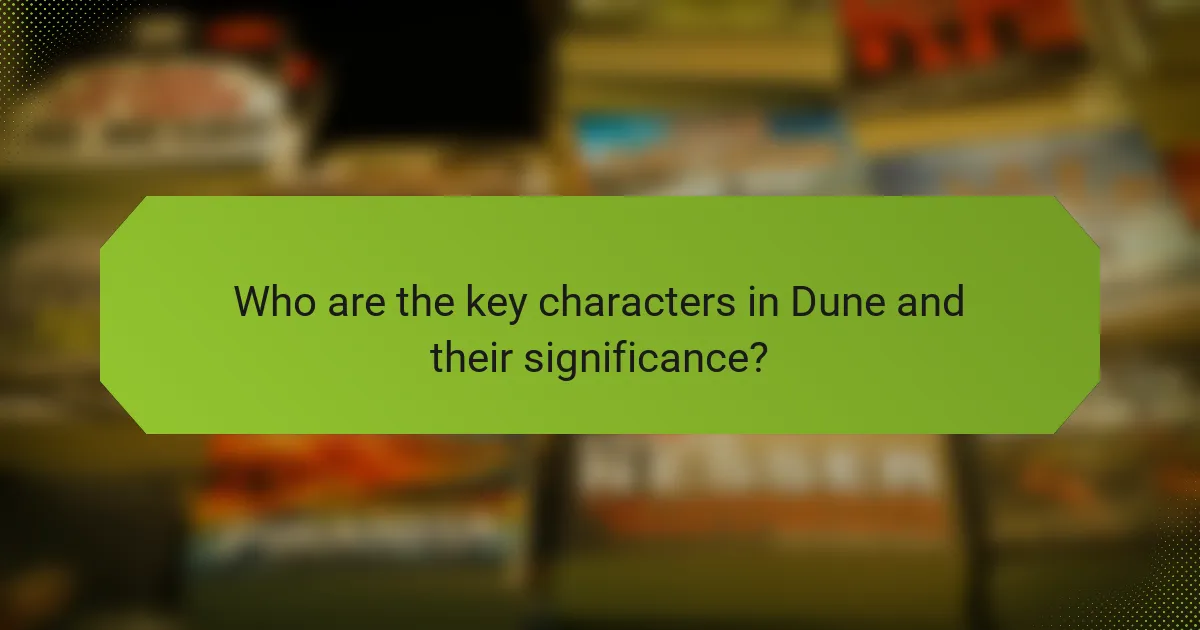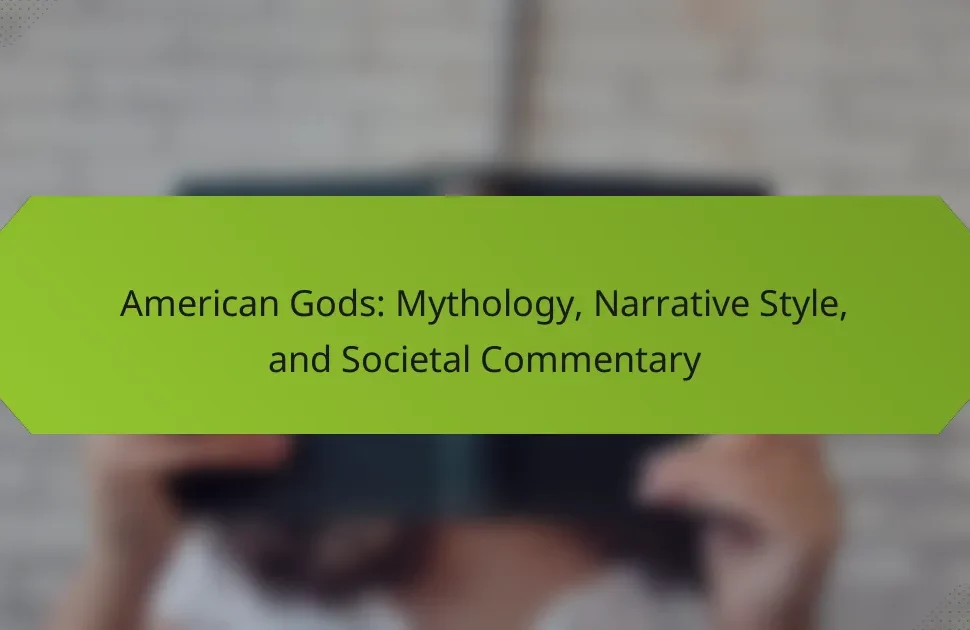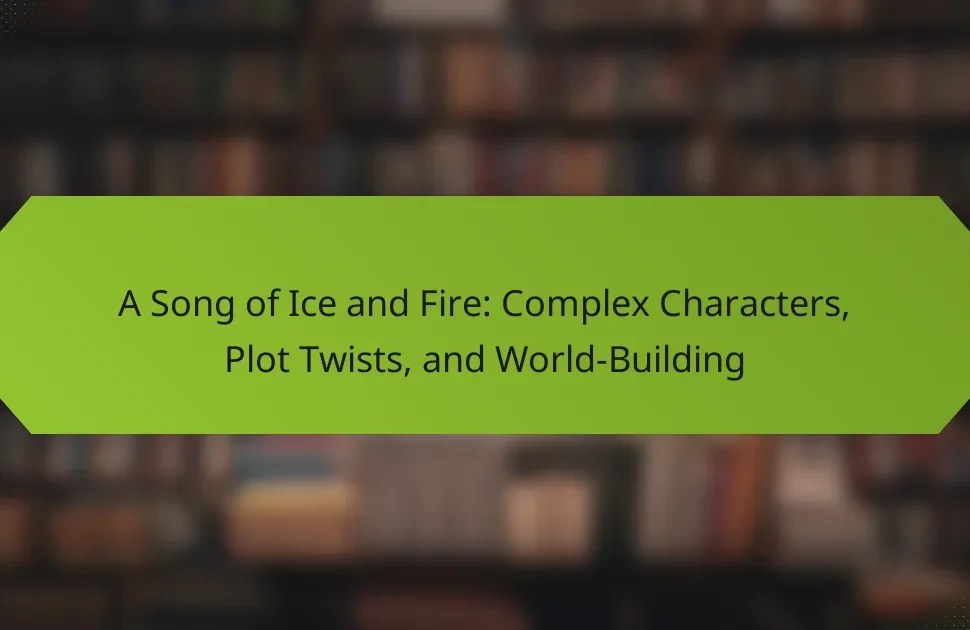Frank Herbert’s Dune offers insights into power dynamics, ecological issues, and human potential. The article explores key themes such as resource scarcity and leadership, analyzes pivotal characters like Paul Atreides and Lady Jessica, and examines the intricate world-building of Arrakis. Additionally, it highlights the novel’s relevance to contemporary societal challenges, including environmentalism and social justice.

What are the central themes in Frank Herbert’s Dune?
Frank Herbert’s Dune explores themes of power, ecology, religion, and human potential. The struggle for control over the spice melange illustrates the intersection of politics and resource scarcity. Environmentalism is central, showcasing the relationship between humans and their environment. The novel delves into prophecy and destiny through the character of Paul Atreides, emphasizing the consequences of leadership. Additionally, it examines the complexities of human nature and the potential for transformation, making it a profound commentary on society and individual agency.
How does the theme of power manifest in Dune?
The theme of power in Dune manifests through the complex interplay of politics, religion, and ecology. Characters like Paul Atreides navigate a landscape where control over spice, the universe’s most valuable resource, symbolizes ultimate power. Herbert illustrates how power can corrupt and lead to tyranny, as seen in the oppressive rule of House Harkonnen. Additionally, the influence of prophecy and belief systems shapes the characters’ motivations, highlighting the multifaceted nature of power in shaping destiny.
What role does ecology play within the narrative of Dune?
Ecology plays a crucial role in Dune by shaping its narrative and character motivations. The intricate relationship between the environment and the inhabitants of Arrakis drives the plot and highlights themes of survival and adaptation. The desert planet’s ecology influences resource scarcity, particularly water, which is central to the story’s conflict.
The unique attribute of the sandworms showcases the delicate balance of this ecosystem, as they are vital to spice production and thus the economy of the universe. The rare attribute of the Fremen’s water conservation techniques illustrates their deep understanding of ecology, allowing them to thrive in harsh conditions. As a result, ecology serves not only as a backdrop but also as a driving force for character development and thematic exploration in Herbert’s epic.
How is the concept of prophecy explored in Dune?
The concept of prophecy in Dune is explored through its intricate connection to fate and free will. Prophecies shape characters’ destinies, particularly Paul Atreides, whose journey is deeply influenced by the prescient visions of the future. These visions create a tension between predetermined outcomes and the choices characters make, highlighting the complexity of control over one’s fate. The prophecies also serve as a tool for political manipulation, as various factions interpret them to suit their agendas, illustrating the theme of power dynamics in the universe. Ultimately, prophecy in Dune raises questions about the nature of destiny and the impact of belief on reality.

Who are the key characters in Dune and their significance?
Key characters in Dune include Paul Atreides, Lady Jessica, and Baron Harkonnen. Paul, the protagonist, embodies the struggle for power and destiny. Lady Jessica represents loyalty and the complexities of motherhood. Baron Harkonnen epitomizes tyranny and manipulation. Each character significantly influences the narrative and themes of politics, religion, and ecology.
What attributes define Paul Atreides as a character?
Paul Atreides is defined by his leadership, adaptability, and moral complexity. His journey from noble heir to a messianic figure illustrates profound growth and resilience.
Key attributes include:
– Leadership: Paul exhibits strong leadership qualities, uniting diverse factions.
– Strategic Thinking: He demonstrates exceptional foresight and planning.
– Empathy: His understanding of others’ emotions shapes his decisions.
– Prophetic Vision: Paul possesses prescient abilities that guide his path.
– Cultural Adaptation: He assimilates into Fremen culture, gaining their trust.
These attributes collectively portray Paul as a multifaceted character navigating a complex universe.
How does Lady Jessica’s role influence the plot?
Lady Jessica’s role significantly influences the plot by shaping key events and character dynamics. As the Bene Gesserit, she embodies the themes of power and loyalty. Her decisions impact Paul’s journey, particularly her choice to bear a son instead of a daughter, which aligns with the Bene Gesserit’s breeding program. This choice sets the stage for Paul’s emergence as the prophesied figure. Additionally, her complex relationship with Duke Leto and later with the Fremen highlights the intricacies of political alliances and personal sacrifice. Ultimately, Jessica’s character is pivotal in exploring themes of destiny and free will within the narrative.
Which supporting characters have critical impacts on the story?
Supporting characters in Dune significantly influence the narrative and themes. Key figures include Lady Jessica, whose loyalty and abilities shape Paul’s journey; Duncan Idaho, whose bravery and friendship impact key decisions; and Gurney Halleck, whose mentorship provides vital guidance. Each character adds depth to the story, revealing the complexities of loyalty, power, and survival in a harsh universe.

How is the world-building executed in Dune?
World-building in Dune is executed through intricate ecological systems, cultural depth, and political complexity. The desert planet Arrakis serves as a unique setting that shapes its inhabitants and conflicts. Herbert’s detailed descriptions of spice production, water scarcity, and indigenous Fremen culture create a vivid backdrop. The interplay of these elements establishes a rich narrative that explores themes of power, survival, and human nature. The unique attributes of Arrakis, including its harsh environment and the precious resource of melange, drive the plot and character motivations, making the world feel alive and interconnected.
What makes the planet Arrakis unique in the Dune universe?
Arrakis is unique in the Dune universe due to its extreme desert environment, the presence of giant sandworms, and the valuable spice melange. The planet’s harsh conditions shape its culture and economy, making it central to the series’ themes. Arrakis has no surface water, leading to adaptations in its inhabitants, such as the Fremen, who have developed advanced survival techniques. The spice melange, found only on Arrakis, extends life and enhances mental abilities, making it highly sought after across the universe.
How do the cultural elements of Dune enhance the story?
The cultural elements of Dune significantly enhance the story by creating a rich, immersive universe. The diverse cultures, religions, and traditions shape characters’ motivations and conflicts, driving the narrative forward. For instance, the Fremen’s customs and their connection to the desert environment highlight themes of survival and adaptation. Additionally, the intricate political systems reflect real-world power dynamics, adding depth to the plot. The incorporation of ecological concerns underscores the importance of environmental stewardship, making the story relevant and thought-provoking. Overall, these cultural elements contribute to a complex tapestry that elevates the narrative’s impact.
What political structures are present in the Dune universe?
The Dune universe features a complex political structure including feudalism, the Imperium, and the Spacing Guild. The Imperium is a centralized authority led by the Emperor, while noble houses govern planets in a feudal system. The Spacing Guild controls interstellar travel, influencing political power dynamics. Bene Gesserit and other factions further complicate the political landscape through manipulation and secret agendas.

How do the themes of Dune resonate with contemporary issues?
The themes of Dune resonate with contemporary issues such as environmentalism, power dynamics, and social justice. The struggle for resources in Dune parallels today’s climate crises and resource scarcity. The manipulation of political power reflects current global governance challenges. Additionally, the exploration of cultural identity and colonialism speaks to ongoing discussions about race and equity. These connections highlight Dune’s relevance in understanding modern societal complexities.
What parallels can be drawn between Dune’s ecology and today’s environmental concerns?
Dune’s ecology mirrors today’s environmental concerns through its emphasis on resource scarcity and sustainability. The desert planet Arrakis highlights the consequences of overexploitation. Water is a precious resource, paralleling contemporary issues like water scarcity and climate change. The novel illustrates the impact of human activity on ecosystems, reflecting current environmental degradation. Additionally, the intricate relationships among species in Dune emphasize biodiversity’s importance, echoing modern conservation efforts. These themes encourage readers to consider the fragility of their own ecological systems.
How does the exploration of power in Dune reflect modern political dynamics?
The exploration of power in Dune mirrors modern political dynamics through its intricate portrayal of leadership, resource control, and societal structures. Frank Herbert illustrates how power is often tied to ecological and economic factors, similar to contemporary global politics. The struggle for spice reflects real-world competition for natural resources, emphasizing the fragility of alliances and the influence of external forces. Characters like Paul Atreides embody the complexities of leadership, showcasing the burdens and moral dilemmas faced by those in power. This narrative serves as a cautionary tale about the consequences of political ambition and the cyclical nature of history.

What are the distinctive narrative techniques used by Frank Herbert?
Frank Herbert employs distinctive narrative techniques in Dune that enhance its themes and world-building. He uses multiple perspectives to provide depth to characters, allowing readers to understand their motivations. Herbert’s integration of philosophical and ecological concepts enriches the narrative, creating a complex backdrop. Additionally, his use of non-linear storytelling challenges traditional narrative structures, engaging readers in a multifaceted exploration of the universe. These techniques collectively contribute to the epic’s enduring impact and complexity.
How does Herbert utilize symbolism throughout Dune?
Herbert utilizes symbolism throughout Dune to convey complex themes and character motivations. The desert symbolizes both harshness and transformation, representing the struggle for survival. Water symbolizes life and power, illustrating the planet’s ecological challenges. The spice melange serves as a symbol of wealth, addiction, and the intersection of politics and religion. These symbols deepen the narrative, enhancing the reader’s understanding of the intricate world Herbert created.
What role does foreshadowing play in the development of Dune’s plot?
Foreshadowing in Dune creates tension and deepens the narrative by hinting at future events. It shapes character arcs and plot development, guiding readers’ expectations. For instance, early references to prophecy build suspense around Paul Atreides’ journey. This technique enhances thematic elements, such as fate versus free will, crucial in Frank Herbert’s world-building.

What lessons can readers take from Dune’s characters and themes?
Readers can learn resilience, the complexity of power, and the importance of ecological awareness from Dune’s characters and themes. The characters exemplify personal growth through adversity, showcasing how challenges shape identity. Themes of imperialism and resource scarcity highlight the moral dilemmas of leadership and exploitation. The intricate world-building emphasizes the interconnectedness of society and environment, urging readers to consider sustainability and stewardship. Dune serves as a mirror reflecting contemporary issues, making its lessons timeless and relevant.
How can the character arcs in Dune inspire personal growth?
The character arcs in Dune exemplify resilience, transformation, and self-discovery, inspiring personal growth. Paul Atreides evolves from a sheltered noble to a powerful leader, illustrating the importance of embracing one’s destiny. Lady Jessica’s journey showcases the strength of adaptability and loyalty, emphasizing personal sacrifice for greater causes. Duncan Idaho’s loyalty reflects the value of commitment and honor in relationships. These narratives encourage readers to reflect on their own challenges and choices, fostering a deeper understanding of personal identity and purpose.
What practical insights can be gained from the themes of Dune?
Practical insights from the themes of Dune include the importance of ecological awareness, the complexities of power dynamics, and the interplay between religion and politics. These themes offer valuable lessons on sustainability, leadership, and the influence of belief systems in shaping societies.
Dune emphasizes ecological interdependence, showcasing how environmental factors affect human behavior and societal structure. The narrative illustrates the consequences of exploitation and the need for harmony with nature.
Power dynamics are central to the story, highlighting how authority can corrupt and the necessity of ethical leadership. Characters navigate intricate political landscapes, revealing the challenges leaders face in making moral decisions.
The relationship between religion and politics in Dune serves as a cautionary tale about fanaticism and the manipulation of faith for power. This theme encourages critical examination of belief systems and their societal implications.




